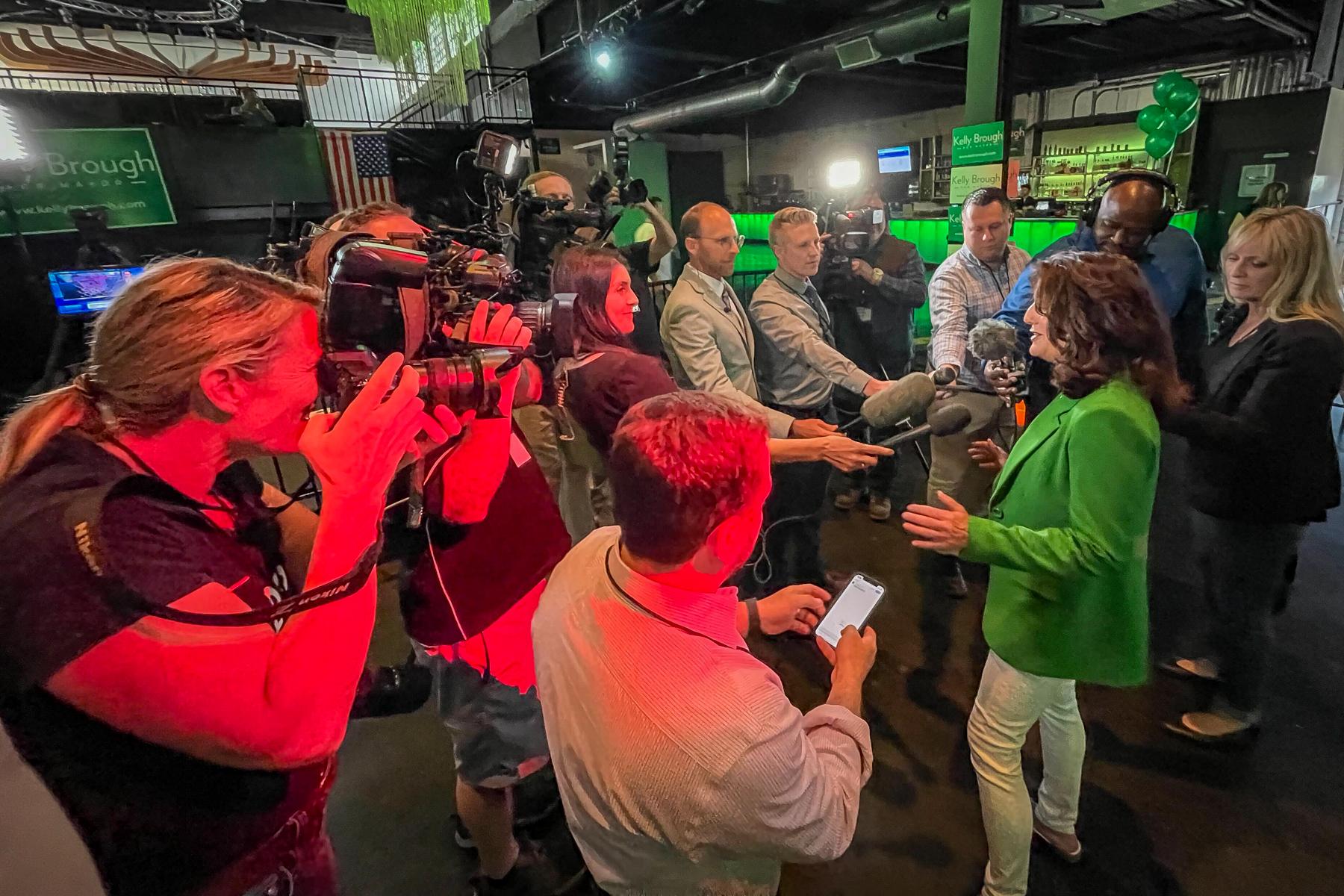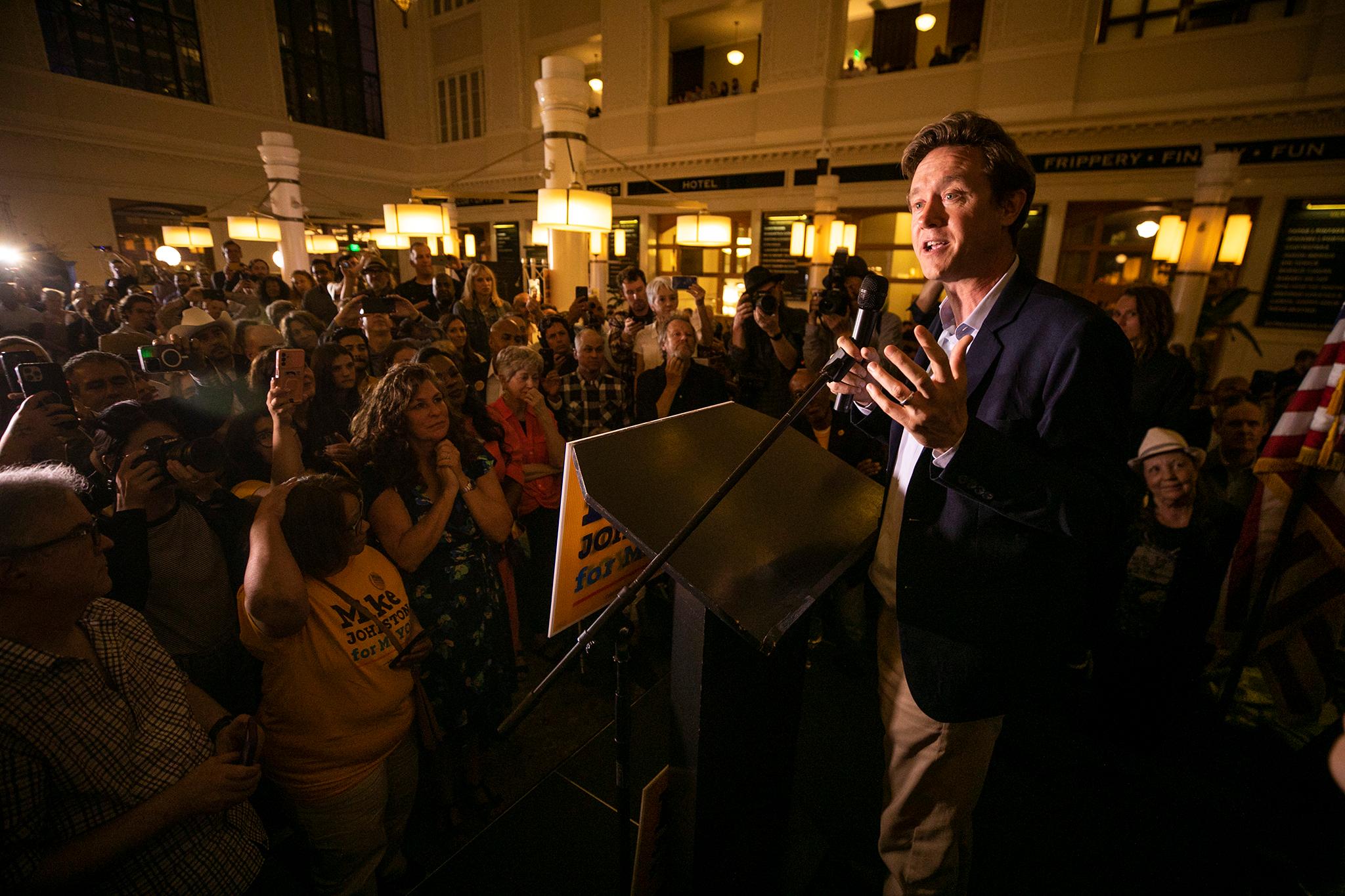Mike Johnston will be Denver's next mayor.
Johnston got about 55% of the vote so far. Unable to make up the difference, Kelly Brough conceded after the 10 p.m. election results drop, meaning Denver will not have its first woman mayor.
Brough had just under 45% of the vote as of 11:30 p.m.
"Tonight, we write a new chapter," Johnston said to a crowd of raucous supporters at Union Station Tuesday night. "Tonight we start a chapter about a city that is going to be big enough to care for all of us, to support all of us, to house all of us. That is our dream of Denver. This is our Denver. This is our dream. Let's now go to work to build this into America's best city."
Johnston was endorsed by former Mayor Federico Peña and most of the progressive candidates who competed in the general election, including third-place candidate Lisa Calderón and fifth-place candidate state rep Leslie Herod.
The win marks a big comeback win for the dogged politician who has lost against Jared Polis in a race to be governor and withdrew from a Senate race to make way for John Hickenlooper.
His campaign and the independent expenditure committee backing him raised more than $4.2 million in out-of-state money from billionaires Reid Hoffman, who gave $1.3 million, and former presidential candidate Michael Bloomberg, who gave $500,000, along with significant support from DaVita's former CEO Kent Thiry. Those donations raised questions from his opponents about whether he had been bought off by coastal billionaires who had designs on Denver.

Johnston was raised in Vail and studied at Yale, where he was a member of the elite secret society, Skull and Bones. After graduating, he was a principal at an alternative high school; an education reformer who butted heads with teacher unions; a state senator; and CEO of the foundation Gary Community Ventures.
He was also the architect of Proposition 123, which could be a major funding source for homelessness prevention and income-restricted housing construction if the city manages to speed up its permitting process to meet required deadlines.
On the campaign trail, Johnston made big promises to turn Denver into the best city in the United States. He pledges to end homelessness in his first term by building 1,400 tiny homes and converting motels to shelters. He says he will build 25,000 units of new housing, focusing on the missing middle. To address public safety, he will hire more cops and social workers and provide young people with more after-school programs.
He has touted that each of his campaign promises are specific and that he has a way to pay for them.

Johnston largely kept his personal life out of the race.
Until the final weeks, Johnston avoided negative campaigning, though he and his backers did take swipes at Brough for positions she took when she led the Denver Metro Chamber of Commerce, including her opposition to some environmental regulations, raising the minimum wage, paid family leave and her close relationship with the oil and gas industry.
The Johnston campaign distinguished itself by claiming it would not arrest people for being homeless, though he does support the Hancock-era urban camping ban.
Brough, former Mayor John Hickenlooper's chief of staff and longtime head of the Denver Metro Chamber of Commerce, trailed Johnston by almost 11,000 votes by the time she conceded.
After calling Johnston to concede, Brough stood on stage at the end of the night to address her supporters.
"You should all just take a minute and just look around," she said. "You know what I see in this room is a lot of power. A lot of the kind of power and love that money can't buy, and I'm so grateful."
Brough said the hardest part of campaigning was the vulnerability of sharing her story.
"Yet what I loved about it is my story is your story," she said. "It's our story of Denver: a story of loss and pain, imperfection and struggle, vulnerability. But it's also a story of hope and resilience and strength, the same things we see throughout our city."
After thanking her supporters, she acknowledged she had reached out to Johnston.
"I called Mike," she said. "And I hope he is surrounded by as beautiful people as I am tonight. And I wished him godspeed in the work ahead. Because our city is challenged, and it needs a lot of work."
Sheila MacDonald, Brough's campaign manager, said after the first results drop of the night that it's clear her candidate was the underdog in the fight.
"I'm not going to lie," she said. "It's hard when you're going up against so much money. They did 10 pieces of mail. Their digital was 10 times what ours was. They were able to touch the voters with more money. It's not rocket science."
Brough's strategy was to connect with voters directly. MacDonald said she spoke to more than 25,000 Denverites.
"I bet you Kelly was in over 130 living rooms just meeting with people," she said. "In terms of coffees, we probably had 50 or more coffees across the city. And it's more work than just shooting off a mail piece. But it's who she is. It speaks to her authenticity. It speaks to her leadership style. And it speaks to the kind of Mayor she she will be."
Brough has received support from former Mayor Wellington Webb, the Denver Republican Party, the police union and former mayoral candidates Chris Hansen and Kwame Spearman, among others.

This was Brough's first time running for office.
Her campaign, which lagged Johnston in fundraising, had support from Republican mega-donors Pete Coors, Philip Anschutz and Pat Broe.
Brough distinguished herself in the race by contrasting her hardscrabble childhood and life as a single mother who lost her husband to suicide with Johnston's privileged upbringing.
While she was glad to lean on her personal life when it helped her case, she downplayed her longtime partnership with powerhouse lobbyist David Kenney, who made few appearances with her during the campaign. Kenney has championed some of Denver's biggest corporations to the city, though Brough and Kenney said he would have cut ties with all clients working in Denver, had she been elected.
Along the way, Brough also downplayed her advocacy for the business community in her time as the Chamber's head, where she advocated against a raise in the minimum wage, paid family leave and some environmental protections. She also stated that business interests and everyday people's interests were always aligned.
Brough pitched herself as a coalition builder, with people from both left and right working on her campaign. She argued she was ready for the job the day she took office and has a deep understanding of how city government operates from her time in the Hickenlooper administration.
Brough pledged to end encampments in her first term by creating safe occupancy sites and said she would build income-restricted housing above publicly owned parking lots. Unlike Johnston, she said she would have police arrest people who were living on the streets and refused services in extreme cases -- a sticking point for progressives like Herod who did not back her.
Brough's campaign, which initially indicated it would not go negative, doubled down on messaging from A Better Denver, the independent expenditure backing her. She argued Johnston had inflated his record, mischaracterized her record, and inappropriately took out-of-state billionaire money, alleging his backers were trying to buy the election for some unstated purpose.
When questioned about her own billionaire backers, with deep financial interests in Denver, she said they cared about the future of the city like any resident.

Mayor Michael Hancock congratulated Johnston in a statement on becoming the city's 46th mayor:
"His experiences as a nonprofit community leader, legislator and educator have prepared him to hit the ground running. I'm confident the city will be in good hands and my team stands ready to support the incoming administration. I look forward to a smooth, collaborative transition over the next few weeks and will do everything possible to ensure Mayor-elect Johnston is ready to get to work on behalf of all the residents of Denver on July 17."
CPR News reporter Ben Markus contributed reporting. This article has been updated with comments from Johnston, Brough and the latest unofficial vote results.













